The Corne¬ Daily Sun







Approximately 50 students staged a pro-Palestine encampment on the Arts Quad as of early Thursday morning.
Cornell follows demonstrators at several other institutions establishing “liberated zones,” which have prompted mass arrests and suspensions. Demonstrators are stating they will continue the encampment until the University meets their demands or removes them from campus.
The Coalition for Mutual Liberation, a pro-Palestine coalition of over 40 organizations, organized the encampment. Approximately 17 tents are enclosed by a lowto-the-ground tarp fence in front of McGraw Hall. According to an email from CML to The Sun, the encampment was established at 4 a.m. and administrators told the demonstrators to move twice by 9 a.m.
Anyone is welcome to enter the “liberated zone,” so long as they complete an “arrest intake form" to help CML keep track of and support protestors should they be arrested and placed in jail.
The demonstration comes a week after the majority of student voters approved of a ceasefire and divestment referendum, held from April 18 to April 19.
According to a CML press release, demonstrators are asking the University to take action on
eight demands including providing restitution to Indigenous communities, ensuring transparency in its current finances, divesting from “morally reprehensible activities” as per the 2016 Standard Guide to Divestment Consideration, dissolving partnerships with the Jacobs-Technion Cornell Institute and any other partnerships with the Technion Israel, establishing a Palestinian studies program under the College of Arts and Sciences, publicly acknowledging and protecting anti-Zionist perspectives, recognizing that anti-Zionism is not antisemitism and removing all police from campus including from student protests.
“You don’t have to be in here to be in the liberated territory. The liberated territory is a concept. The liberated territory is in your head,”
Prof. Russell Rickford
Demonstrators are asking for police to be replaced with an emergency response team composed of healthcare workers and first responders trained in de-escalation. They are also asking for total legal and academic amnesty for all individuals involved in the encampment and similar demonstrators.
Starting at 11:30 a.m., approximately 300 supporters began gathering around the encampments.
With supporters surrounding the encampment,
Following negotiations between demonstrators and the administration over the pro-Palestine Arts Quad encampment, four students have been temporarily suspended.
Today at 3:08 p.m., the University notified the four students about their suspensions in an email obtained by The Sun signed by Christina Liang, director of the Office of Student Conduct and Community Standards.
Three of the suspended students were Bianca Waked grad, Momodou Taal grad and Nick Wilson ’26, confirmed in interviews with The Sun. The fourth suspended student declined to share their identity with The Sun. Taal and Waked are international students, meaning suspensions threaten their legal status in the country.
Students are being charged with unauthorized use of University property by engaging in or facilitating outdoor camping on the Arts Quad without approval, failure to
comply with University directives to remove the unauthorized encampment, unreasonably loud chants and behavior, failure to disperse from the Arts Quad and staying past 8 p.m. on April 25 — the initial deadline to leave given by administrators.
Waked, who is Deaf, was still charged with unreasonably loud behavior.
The suspension is effective immediately, pending a resolution of the underlying
conduct action. According to the Cornell Student Code of Conduct, suspended students do not receive credit for their coursework the semester, class attendance, participation in examinations and utilization of University premises and facilities may be withdrawn. During the suspension period, the students will not be allowed on campus, except for special cases.

Bianca Waked grad listed grievances about the University and occupant’s list of demands.
To continue reading this story, please visit www. cornellsun.com.
Gabriel Muñoz can be reached at gmunoz@ccornellsun.com.
Julia Senzon can be reached at jsenzon@ccornellsun.com.
Kate Sanders can be reached at ksanders@ccornellsun.com.
Matthew Kiviat can be reached at mkiviat@ccornellsun.com.
Eric Reilly can be reached at ereilly@ccornellsun.com.
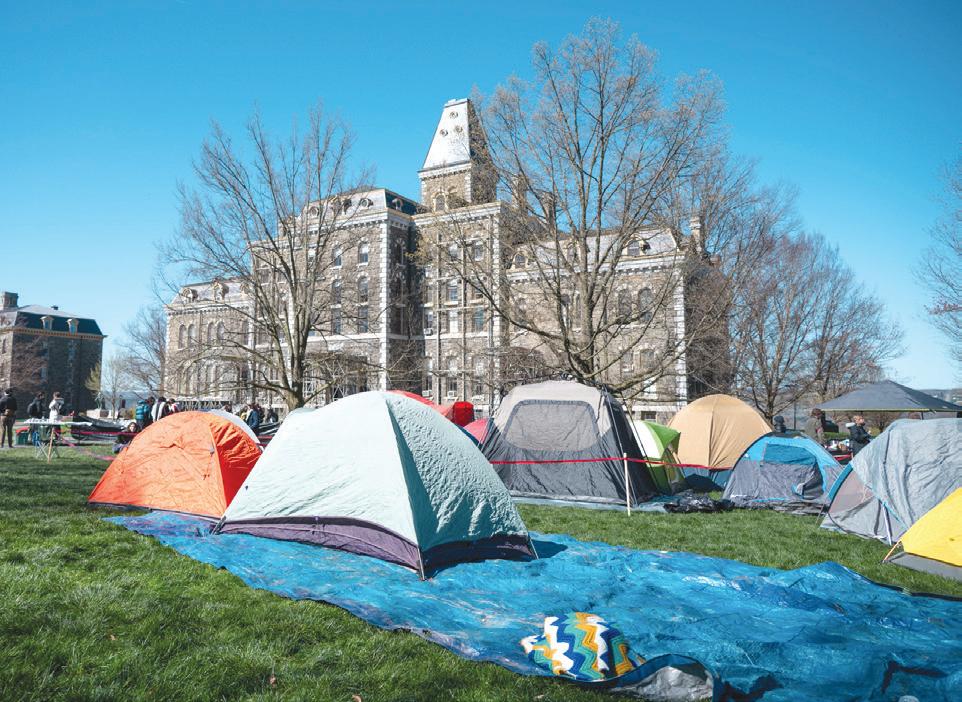
On Monday, President Martha Pollack released her first email statement to the Cornell community since the establishment of the pro-Palestine student encampment last Thursday. Pollack condemned the protestors’ actions and warned of more disciplinary action.
President Pollack described that on the first day of the demonstration, the administration initially offered for the protest to be moved between Day Hall and Sage Chapel under an approved permit. The statement said protestors were given multiple opportunities to consider the offer across a five-hour time span, but ultimately declined to move.
Pollack said the protest was initially registered under a “dishonest” request, with the event falsely advertised as just an art installation without tents. The protesters had also only reserved the space until 8 p.m. In response to protestors' refusal to leave, four temporary suspensions were issued.
“With full knowledge of the sanctions to come, they again refused to comply, and we moved forward with a first set of immediate temporary suspensions,” Pollack said.
The statement confirmed that the University administrators engaged in active negotiations with the protestors, including throughout the weekend, to again allow them to move to an alternate location. Pollack announced more temporary suspensions for students and human resources referrals for employees participating in the encampment are to come.
“We must enforce our policies in a consistent manner,” Pollack said. “Our policies are content-neutral for a reason, and we need to apply them in the same way in all cases, both today and into the future.”
To continue reading this story, please visit www.cornellsun.com



On the first day of a pro-Palestine encampment on the Arts Quad, the Student Assembly unanimously passed a resolution supporting the rights of student protesters at its Thursday meeting.
At the same meeting, three administrators — Provost Michael Kotlikoff, Dean of Students Marla Love and Vice President and General Counsel Donica Varner — came to discuss the controversial Interim Expressive Activity Policy with student representatives, who expressed concerns about students’ ability to freely express their beliefs on campus.
Support for Peaceful Protest, Regardless of Ideology
Resolution 77, which was sponsored by 20 campus and community organizations, formally supports the ability of students to freely express their opinions on campus.
The resolution highlights that the Assembly “stands in unity” with the demonstrations and encampment, not because all members explicitly agree with what is being protested for, but because they support students’ right to “protest on behalf of their beliefs.”
The resolution also condemns any disciplinary action taken against students during peaceful protests. Last month, 22 students were arrested after occupying Day Hall to advocate for divestment from weapons manufacturers, and on Friday, four students were temporarily suspended for staging an
www.cornellsun.com

encampment on the Arts Quad.
The resolution points to Cornell’s role in the divestment movement against South African apartheid. In 1985, demonstrators enacted shantytown encampments, which led to about 100 student arrests.
Over 1,000 students, faculty and staff were arrested across the entire movement.
The resolution asserts that the University has a history of suppressing “unpopular” free speech and that this behavior continues today.
Resolution sponsor Karys Everett ’25, LGBTQIA+ liaison at-large, explained that the goal of the resolution’s adoption is to highlight that the broader Cornell community supports all forms of peaceful protest and students’ right to freedom of expression.
“I think that we’re showing our student body that as their elected representatives, we do respect the right to protest and the administration is giving them pushback as individuals who are here to represent them — we stand with the right to protest regardless of their political beliefs,” Everett said.
In discussing the resolution, J.P. Swenson ’25, student trustee, said that while the University punitively punishing students for peaceful protest is unacceptable, there needs to be a clear distinction between what classifies as peaceful and what does not.
“I don’t think that the entirety of the student body agrees that peaceful protests mean you’re allowed to go into a library for a long time making a lot of noise,” Swenson said.
“If you go into a classroom with
a massive speaker and just blast the speaker for three hours, that is an example where that is, in my sense, unacceptable.”
Executive Vice President Claire Ting ’25 said that protests are intended to be disruptive in order to achieve specific goals.
“I think it’s kind of dangerous for undergrads trying to carve out the lines of what is considered peaceful protests or acceptable,” Ting said. “What is a protest if it is not subverting the norms to push against the status quo?”
Everett said that the resolution intends to support the right of all students to peacefully protest, regardless of ideology.
“One day, if students come in here with a different belief than my own, and they are being penalized in the same way, I will be the first to advocate for them because I believe it’s very important for us to stand up for students’ rights,” Everett said.
Students Debate Interim Policy with Administrators
Provost Michael Kotlikoff, Dean of Students Marla Love and Vice President and General Counsel Donica Varner spoke about the Interim Expressive Activity Policy and directly answered questions from students.
To continue reading this story, please visit www.cornellsun.com.
Matthew Kiviat can be reached at mkiviat@cornellsun.com.
Dorothy Frace-Miller can be reached at dorothyfrancemiller@ cornellsun.com.
Just over one month ago, 22 students occupying Day Hall were arrested for trespassing University property. On Thursday morning, the University told students staging an encampment on the Arts Quad that they were at risk of similar consequences.
Vice President of University Relations Joel Malina released a statement announcing that students were “dishonest” in their event registration and in violation of University policy for pitching tents. According to the statement, Climate Justice Cornell obtained permission for an art installation on the Arts Quad until 8 p.m., but did not receive authorization to pitch tents.
“[Individuals protesting] were then told that if the tents were not taken down promptly, they would be subject to disciplinary action,” Malina wrote in the statement. “They did not comply, and suspensions, for students, and Human Resources referrals, for faculty and staff, will be issued.”
The protest comes as college students across the nation have assembled similar pro-Palestine encampments. Police action has been taken at peer institutions such as Columbia University, Yale University and Princeton University.
As students navigate complex legalities surrounding First Amendment rights and unique university expression policies, The Sun examined the key policies that outline Cornell protesters’ legal rights.
Cornell as a Private Institution
The First Amendment guarantees citizens’ rights to free speech, religion, press, assembly and petitioning. Congress is prohibited from establishing any laws to restrict such rights. However, this does not stop private entities from enacting such restrictions.
To continue reading this story, please visit www.cornellsun.com.
Marisa Cefola can be reached at mcefola@cornellsun.com.
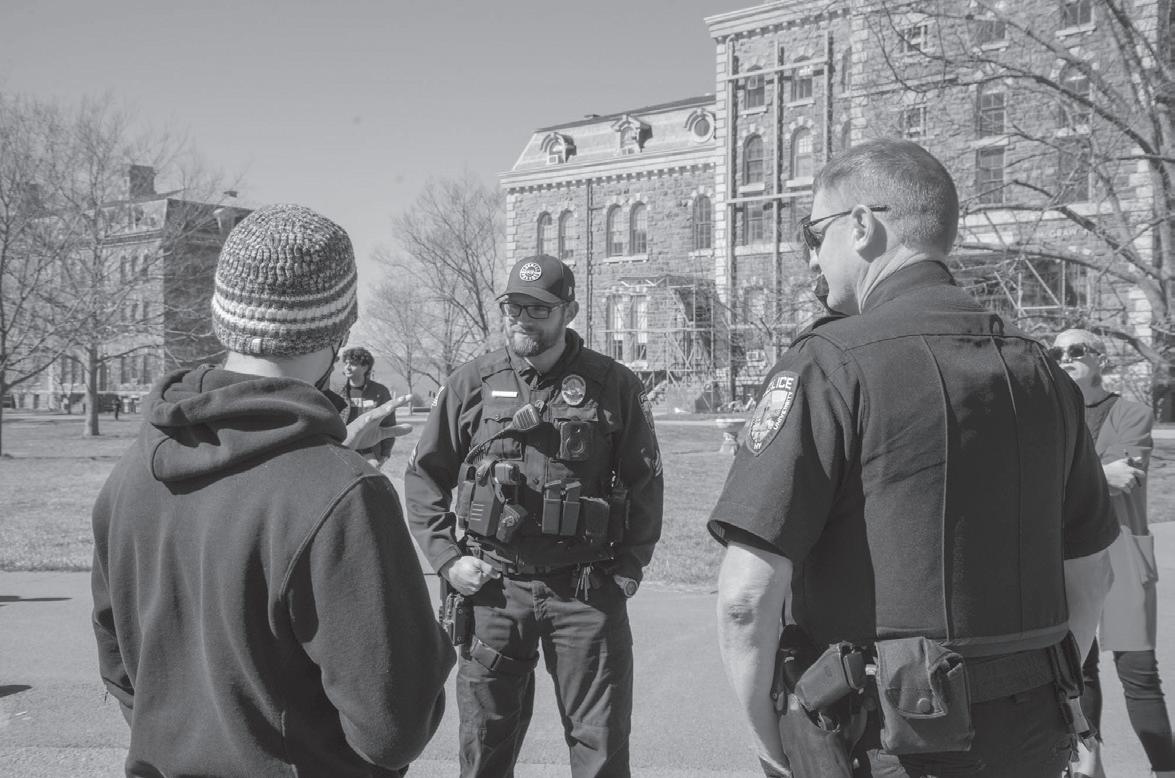

Just over one month ago, 22 students occupying Day Hall were arrested for trespassing on University property. On April 17, the students accepted a deal from the District Attorney’s Office for charges against the protestors to expire on May 16, pending no further arrests before then.
Now, demonstrators from March 21 are navigating the potential consequences of participating in further protest activity, namely with the pro-Palestine encampment on the Arts Quad established on Thursday.
On Thursday, encampment participants were informed that they risked arrest or academic suspension if they remained in the area after 8 p.m. At 3:08 p.m. on Friday, four students — including two international graduate students — were notified that they were temporarily suspended by email.
One of these protestors was Nick Wilson ’26, who was also arrested due to the Day Hall occupation. Other Day Hall participants have been seen participating in the encampment with differing degrees of involvement.
As the encampment continues
for a third day, and the administration committed to further temporary suspensions, student protesters are navigating possibilities of disciplinary action and arrest, with some considering the potential violation of their existing dismissal deal for Day Hall arrests.
Prof. Sujata Gibson, law, principal attorney at The Gibson Law Firm, previously served as assigned counsel for the Day Hall demonstrators through Tompkins County Assigned Counsel.
Gibson explained that charges could open back up if protestors violate the terms of the arrest deal, called an Adjournment in Contemplation of Dismissal, also referred to as an ACD, if the Day Hall demonstrators were re-arrested.
“Now, if the [second] charges were completely flimsy, there may be a way to negotiate that or discuss it. But that would have to be a matter for negotiation,” Gibson said. “The D.A. would have every right to open it back up.”
According to Gibson, past trespassing charges and allegations should not be a factor in determining the severity of a second potential charge. Gibson also explained that breaking the terms of the current ACD could decrease the likelihood that the District Attorney’s Office will provide a similar option
again, though she noted there are other factors that go into a decision like that.
Some of the Day Hall participants said they considered the threat of being arrested again changed when deciding upon their involvement in the encampment.
Maral Asik ’24, one of the arrested protestors from the Day Hall occupation, decided to limit her involvement with the encampment based on her ACD deal. Asik is not an organizer of the encampment or participating inside the encampment.
“Personally, I want to go to grad school. Financially, I’m not prepared to take another semester and have to pay for it if I were to get suspended,” Asik said. “Because [suspensions and arrests] just seem way more likely now, especially because I have a prior record, … I have a risk limit and those things are beyond it.”
Elliot Walsh ’24, another arrested protestor from Day Hall, shared Asik’s decision to limit his involvement with the encampment specifically because of the previous legal action taken against him by the University.
“For me, it feels like the more that I’ve accrued, the more nerve wracking it is to do anything,” Walsh said. “The reasons behind the sort of discipline — legally and
within the University — that people have gotten is intended to have this chilling effect to discourage people from continuing.”
On Thursday, University administrators told protestors to remove tents by 1 p.m. or face disciplinary action, up to and including suspension, and to vacate the premises by 8 p.m., marked with threats of arrests and suspension.
Neither deadline was met.
But no students were arrested and the four students — who represent a small fraction of the approximately 50 encampment participants — were not suspended till Friday afternoon.
The University’s delayed response to the Arts Quad encampments differs from its immediate arrest of 22 students and two staff members at the Day Hall occupation when they passed the 6 p.m. deadline to leave.
In an interview with The Sun on Friday before his suspension, Wilson said he believed that due to the encampment’s public location, the administration avoided immediate arrests to limit public image concerns.
“[The University] can’t avoid the fact that at the end of the day, we’re peers, we’re friends, we’re classmates, we’re people that people recognize on this campus, and that if they publicly do something to
harm us, that’s something that’s going to happen in the public eye,” Wilson said.
When asked about the risk of legal or disciplinary action, especially since he had already been arrested Wilson said, “Right now my friends and my classmates are under attack. … And there’s really no consequence, I think, that would keep me and keep many others from standing with my friends.“
At around 7:45 p.m. on Thursday evening, over 100 people formed a human chain around the encampment as the 8 p.m. deadline to vacate the wpremises neared. Wilson stated that the display of community support provided additional security in the face of disciwwplinary or legal action.
“Ultimately, our safety is in the hands of our community and for students who have a friend in the encampment or know someone who has been involved in this action,” Wilson said. “It falls to those students to stand up for their friends to stand up for their community and ensure their safety.”
To continue reading this story, please visit www.cornellsun.com.
Avery Wang can be reached at ahw83@cornell.edu.
Ben Leynse can be reached at bleynse@cornellsun.com.
Five days since the staging of a pro-Palestine encampment on the Arts Quad, Cornell has seen minimal organized counter-protests from pro-Israel activists.
But many Jewish community members have expressed discomfort with the encampment in interviews with The Sun. Meanwhile, some encampment participants are Jewish themselves.
On Thursday morning, Talia Dror ’24, vice president of finance for Cornellians for Israel, said that she lives near Columbia University, and when she was home for Passover, she was concerned by antisemitic incidents
associated with the University’s encampment.
Incidents of antisemitic harassment at Columbia have surfaced on social media, including reports of Israeli flags being stolen and attempted to be burned as well as a masked protester appearing to chant “Go back to Poland!” at Jewish students. In another instance, a video showed a person with a sign reading “Al-Qasam’s Next Targets” — referring to Hamas’ armed wing — in front of several Jewish counter-protesters.
Columbia University Apartheid Divest, the coalition organizing the encampment, has attributed these hateful incidents to outsiders who do not represent demonstrators’ message and
purpose.
But to Dror, Cornell students holding an encampment in solidarity with Columbia feels like an endorsement of the antisemitic incidents.
“At this point, all I’m wondering is whether or not it’s safe to be a Jew on Cornell’s campus,” Dror said.
Dror said that Jewish students were advised by community leaders to not interact with Cornell’s encampment due to the incidents at other colleges including Yale and Columbia.
Dror pointed out how Rabbi Elie Buechler — who is associated with Columbia University’s Orthodox Union Jewish Learning Initiative — sent a group message to about 300 predominantly

Orthodox Jewish students recommending them to stay at home due to safety concerns.
Dror also noted how Yale sophomore Sahar Tartak — whom Dror is personally friends with — said demonstrators poked her in the eye with a Palestinian flag. Tartak told CBS News that she believed the alleged assault was targeted due to her wearing a Star of David necklace.
“Jewish students at this campus are not accepted unless they renounce a key part of their identity — being Zionists,” Dror said.
According to Dror, Zionist Jews at Cornell are “shunned by the broader progressive or pro-Palestinian mob.”
Dror said her full name and address were circulated around Sidechat after she published an anti-divestment letter to the editor in The Sun. She emphasized that she believes in “open dialogue,” which “can’t exist unless there is no intimidation.”
Jewish student Davian Gekman ’27 said that he “appreciate[s] the passion” of encampment participants and respects their freedom of expression.
But Gekman said that while he had no opinion about the encampment itself, he said that he thinks demonstrators are unintentionally using chants with antisemitic connotations.
Gekman said that the use of the rallying cry, “There is only one solution: Intifada revolution” — which was condemned by the University in a Saturday statement — does not align with protesters’ calls for a ceasefire or the end of Israel’s occupation. Instead, Gekman interprets call-
ing for an intifada as calling for “the death of the Jewish people.”
The word “intifada” literally translates to “to shake off” in Arabic. The word intifada is often associated with two Palestinian uprisings.
The First Intifada took place in the late 1980s and consisted of mostly nonviolent protests such as boycotts and demonstrations. However, this period was also marked by less frequent armed attacks by Palestinians. Israel’s military response led to steep fatalities.
Following this, Israel and the Palestinian Liberation Organization accepted the Oslo Accords, which recognized Israel’s right to exist in exchange for Israel’s acceptance of the PLO as a Palestinian representative body. Hamas — a U.S.-designated terror organization — rose to power, rejecting and violently resisting the Accords.
This led to the Second Intifada, which took place in the early 2000s. This uprising was incredibly deadly and is remembered for the slew of suicide bombings by Palestinians against Israeli civilians including in buses and in restaurants. 4,300 died as a result of this uprising.
This led to Israel building a security fence around parts of the West Bank and the Gaza Strip, effectively separating Israelis and Palestinians, to prevent future attacks.
To continue reading this story, please visit www.cornellsun.com.
Julia Senzon can be reached at jsenzon@cornellsun.com. Standing watch | Jewish students on campus hold mixed views on the encampment. JASON WU / SUN SENIOR PHOTOGRAPHERA new slate of representatives has been voted onto the Student Assembly, with Zora deRham ’27 winning the presidential race and Adam Vinson ’25 becoming the new executive vice president.
deRham, the current freshman representative, said she will bring a “fresh outlook on Cornell” aided by the institutional knowledge she has gleaned so far from serving on the Assembly.
Plans for her presidency include advocating for Cornell University Emergency Medical Service — a student-operated service that provides free care — to receive funding to establish an ambulance corps. She also aims to expand the payment options at Trillium and Terrace to include meal swipes, modified meal swipes or reduced Big Red Bucks for people who have meal swipes.
deRham also served as a member of the Appropriations Committee throughout the fall semester, where she worked to allocate funds to student organizations. Following the resignation of Vice President of Finance Rocco DeLorenzo ’24, deRham was elected to the position for the remaining weeks of the spring semester.
deRham won the presidential seat with 45.5 percent of qualified votes, with Getulio GonzalezMulattieri ’25 trailing behind with 34.9 percent of the vote. Audrey Pinard ’25, who was disqualified from the race last week but was reinstated on Wednesday, came in third. The Office of the Assemblies does not release the vote counts for disqualified candidates, so it is unknown how many votes were received by current executive vice president Claire Ting ’25 and Emily D’Angelo ’25, who were both disqualified after voting began.
The runner-up for president, GonzalezMulattieri, will obtain an undesignated representative seat. A 35-year-old progressive activist and U.S. Air Force veteran, Gonzalez-Mulattieri told The Sun that divestment from weapons companies that supply arms to the Israeli Defensive Forces is his “main issue” on his platform.
On April 24, The Sun reported that multiple first-year students have accused Gonzalez-
Mulattieri of unwanted advances and harassing behavior for a series of interactions during the academic year. The women, all Brooks School of Public Policy students, said they often felt uncomfortable when in isolated settings with him.
Gonzalez-Mulattieri denied many of the freshman women’s accounts, asserted that he is “extremely friendly” and apologized for misinterpretations of his actions.
Adam Vinson ’25, currently the CALS representative on the Assembly, narrowly won the executive vice president seat by 10 votes. As an S.A. representative, he has chaired and restructured the S.A. Environmental Committee, passed a resolution to protect local endangered species and funded the Ag Quad Farmer’s Market.
In his past term on the Assembly, Vinson collaborated with SUNY student assemblies to pass state-wide suicide prevention legislation on college campuses, helped to create a student worker seat on the S.A. and amended the S.A. Charter to allow students to submit resolutions directly to the S.A. without a community sponsor.
Vinson told The Sun his top priority is improving student life and morale.
The runner-up for executive vice president, current LGBTQIA+ liaison Karys Everett ’25, will receive an undesignated seat. Everett told The Sun that “at heart, I am an activist” and that amplifying marginalized voices is a top priority.
Everett is known for co-sponsoring a resolution on Oct. 12 that called on the University to “recognize the Palestinian right to resistance and contextualize the violence as a direct response to decades of Israel’s occupation.” The resolution did not make it out of committee, largely due to backlash from Jewish groups over a line referring to Hamas’ Oct. 7 attack as a “pivotal milestone” in Palestinian resistance.
In an interview with The Sun in October, Everett apologized for controversial language in the resolution and proposed creating a resolution to unify diverse community groups at Cornell.
The full list of winners is as follows:
- President of the Student Assembly: Zora deRham
’27
- Executive Vice President of the Student Assembly: Adam Vinson ’25
- Brooks School of Public Policy Representative: Eeshaan Chaudhuri ’27
- College of Agriculture and Life Sciences
Representative: Niles Hite ’26
- College of Arts and Sciences Representative: Luigi Berinde ’26, David Suarez ’27 and Saad Razzak ’26
- College of Art, Architecture and Planning Representative: Stephen Zhuang ’26
- College of Engineering Representative: Jeffery Lederman ’26 and Cion Kim ’27
- College of Human
Ecology Representative: Jessica Silverman ’26
- Dyson School of
Business Representative: Rajat Acherjee ’26
- First-Generation Student
To continue reading this story, please visit www. cornellsun.com.
Sofa Rubinson can be reached at srubinson@cornellsun.com. Dorothy France-Miller can be reached at dfrancemiller@cornellsun.com
As the pro-Palestine encampment staged in the Arts Quad nears its 96-hour mark, negotiations between protesters and the University remain inconclusive and more suspensions remain a loom- ing prospect.
On Sunday, April 28, the Coalition for Mutual Liberation called for an 11:30 a.m. emergency rally in support of the encampment in response to a statement released by Joel Malina, vice president for University relations on Saturday, April 27.
The statement confirmed that the University had issued immediate temporary suspensions to several student participants and said that the administration is preparing to issue additional suspensions as well as referrals to human resources for employee participants.
The student organization Climate Justice Cornell was suspended due to applying for the event under what the administration referred to as “false pretenses,” since the student group stated that the event would not include tents and would end at 8 p.m. on Thursday, according to the statement. Participants in the encampment refused to both remove the tents and leave the
area on Thursday.
The statement also condemned some chants from encampment participants, particularly the phrase: “There is only one solution: Intifada Revolution.”
“The protesting group has repeatedly stated that their protest is political and not antisemitic, but these chants belie that claim,” Malina wrote.
At 11:10 a.m. on Sunday, CML sent a statement to The Sun that foresaw that there would be a confrontation with police at noon. However, police presence remained minimal throughout the day, with no notable increase at noon.
The CML statement also claimed that the administration agreed to reverse its decision to evict the four suspended students and to open negotiations with CML over their eight demands due to support from the Cornell community.
“This shift shows the undeniable power of student protests, and that Cornell knows investing in genocide and targeting peaceful protestors is unpopular,” the statement read.
To continue reading this story, please visit www.cornellsun.com.
Gabriel Muñoz can be reached at gmunoz@cornellsun.com.
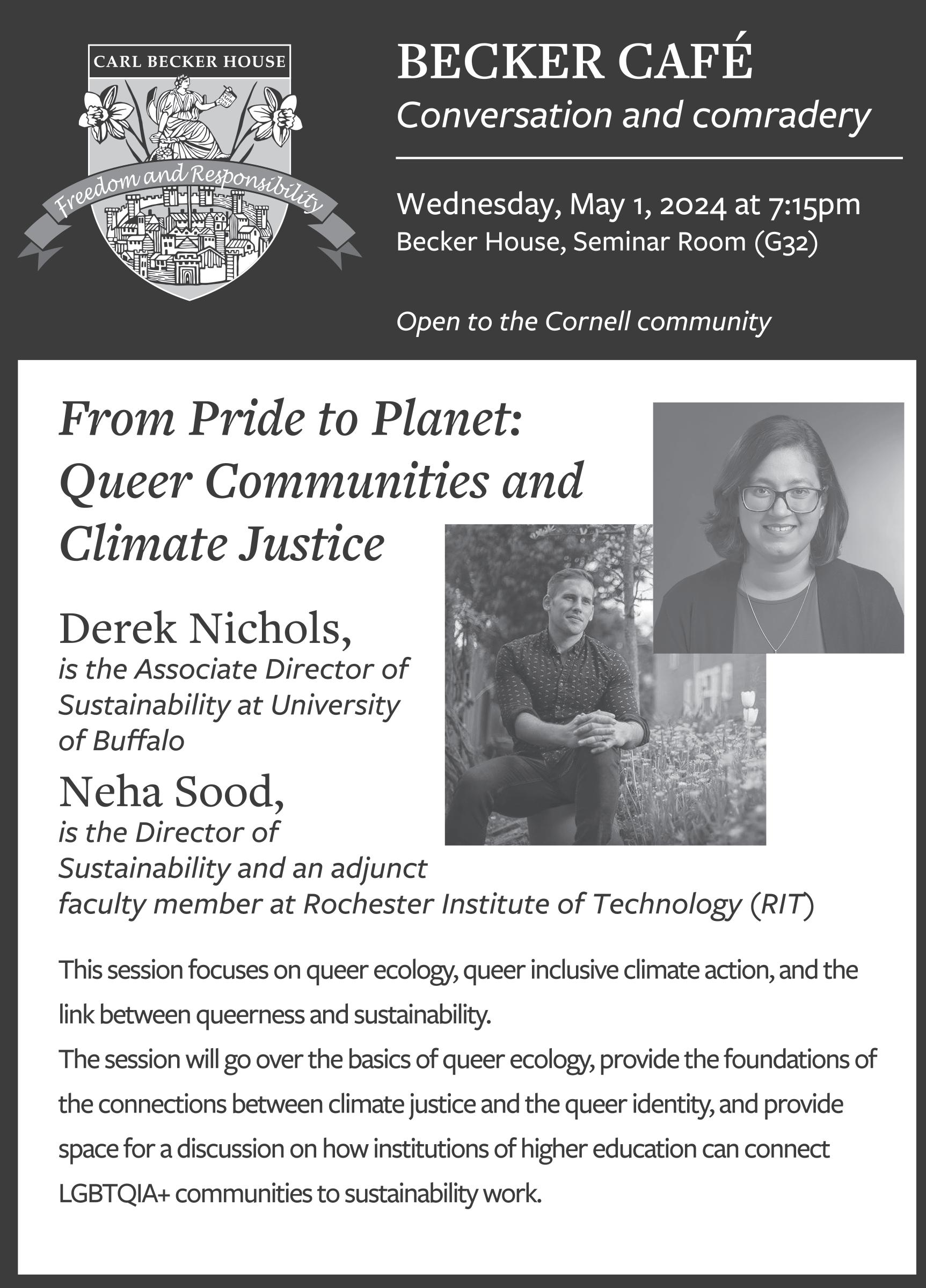
Te encampment is entering its sixth day. Here’s what our photographers have seen
By NINA DAVIS Sun Photography Editor

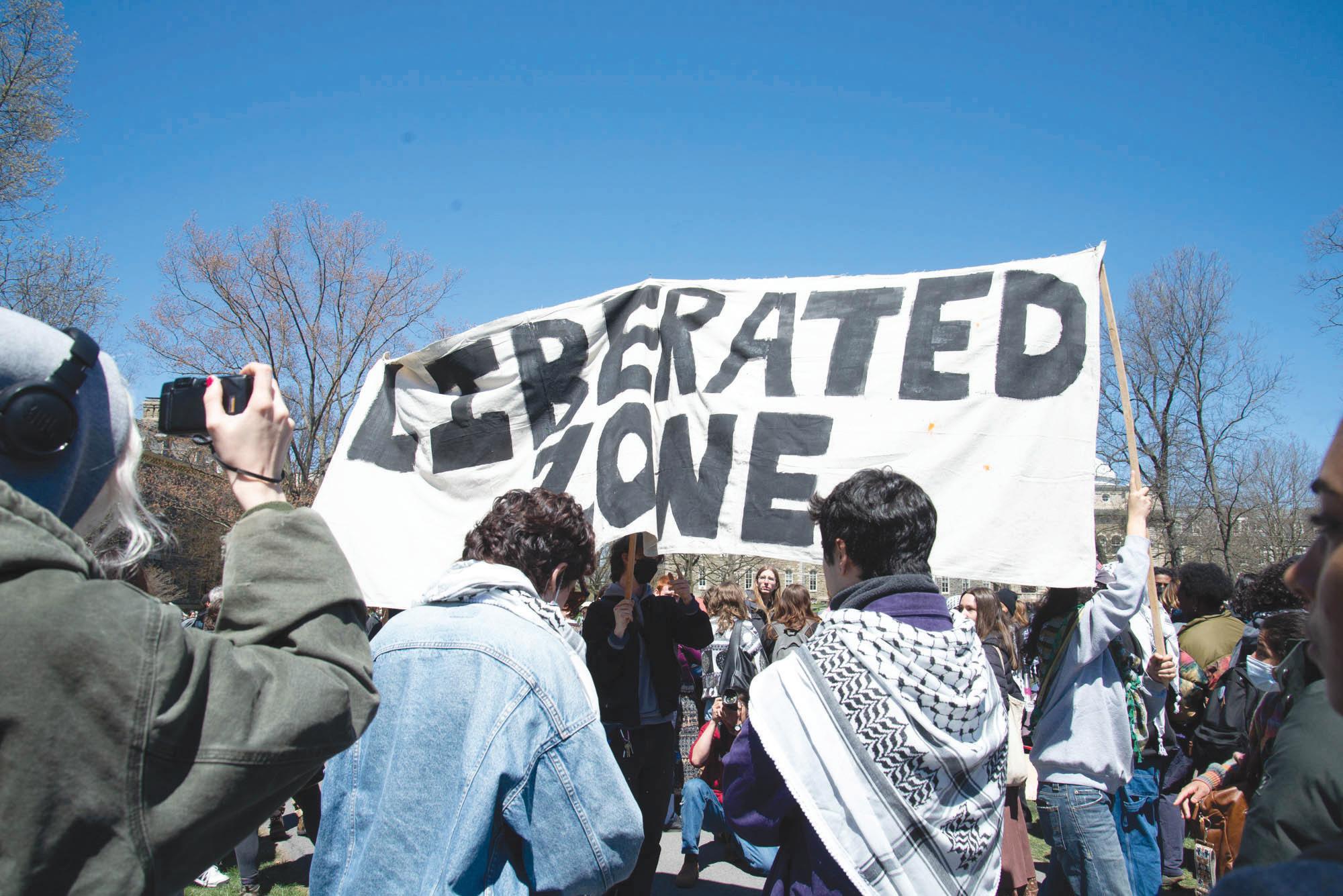
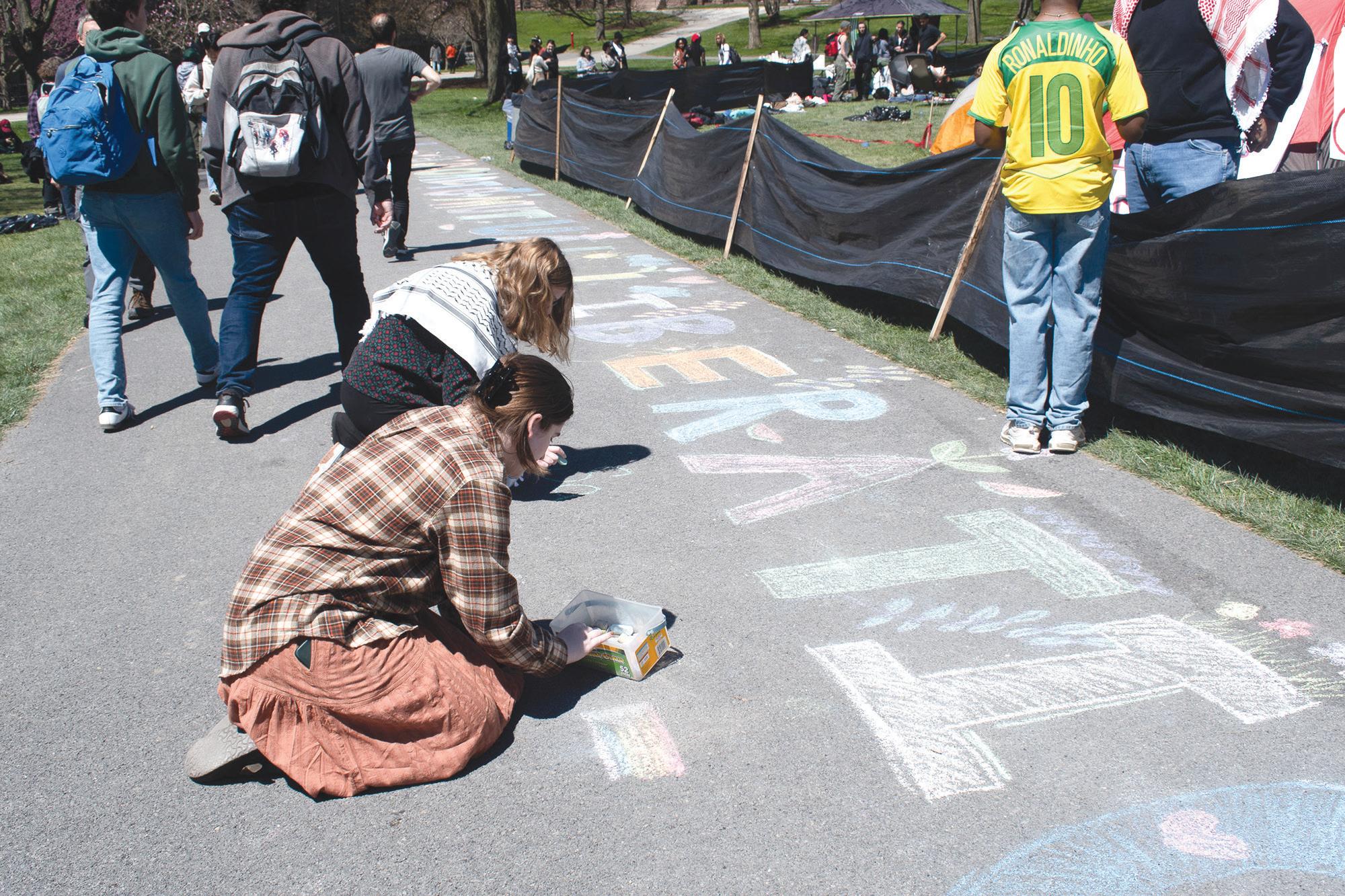
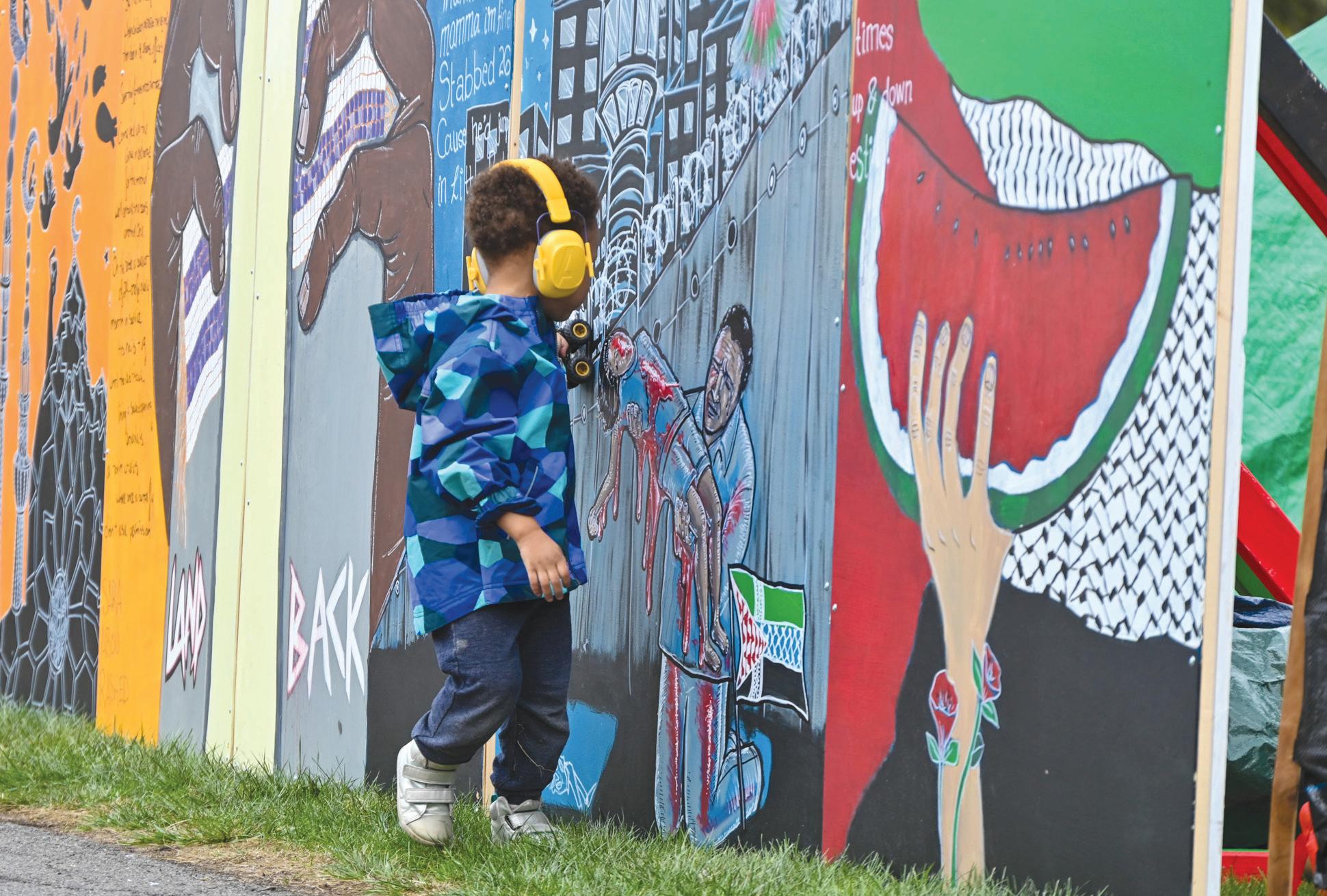
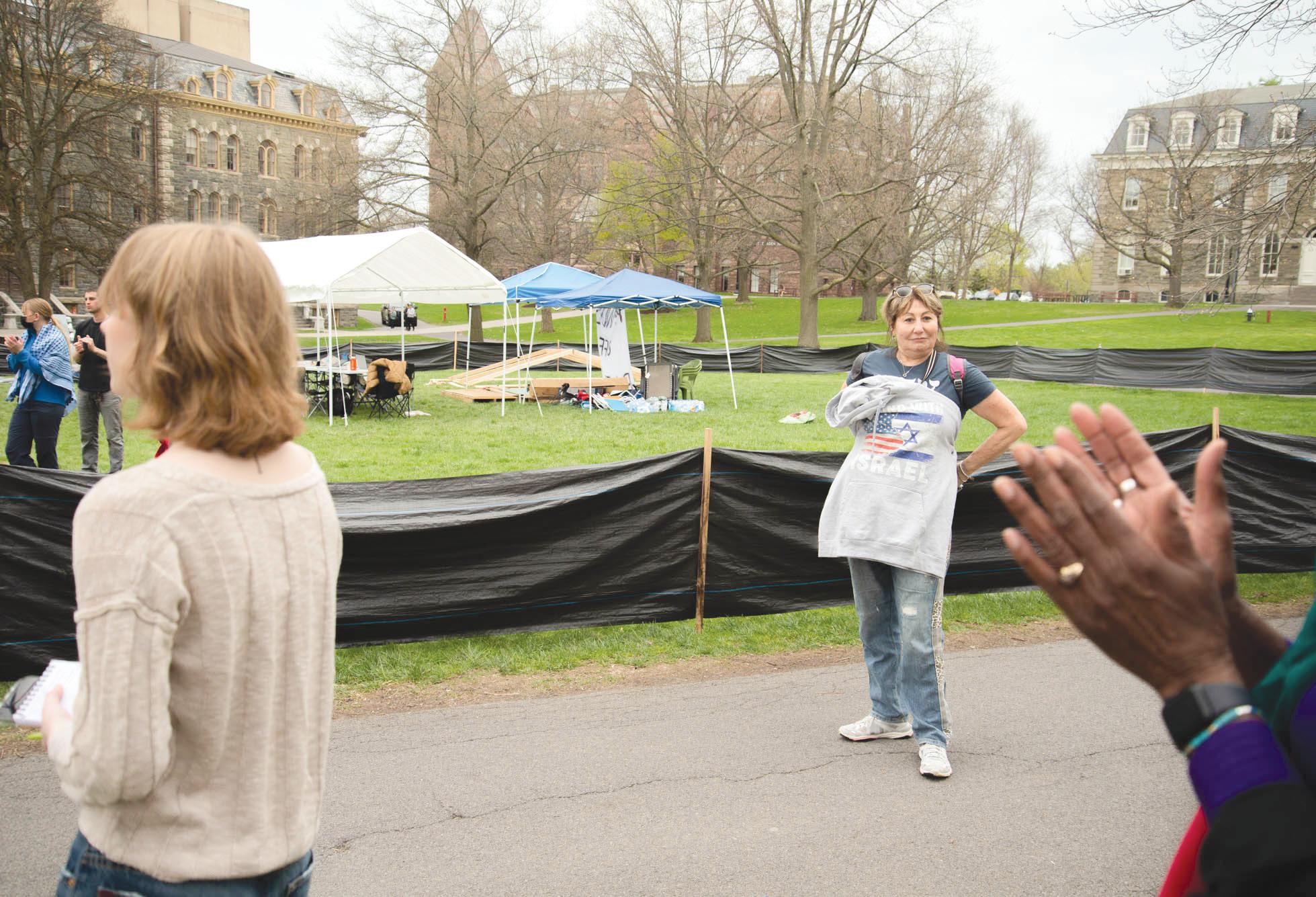
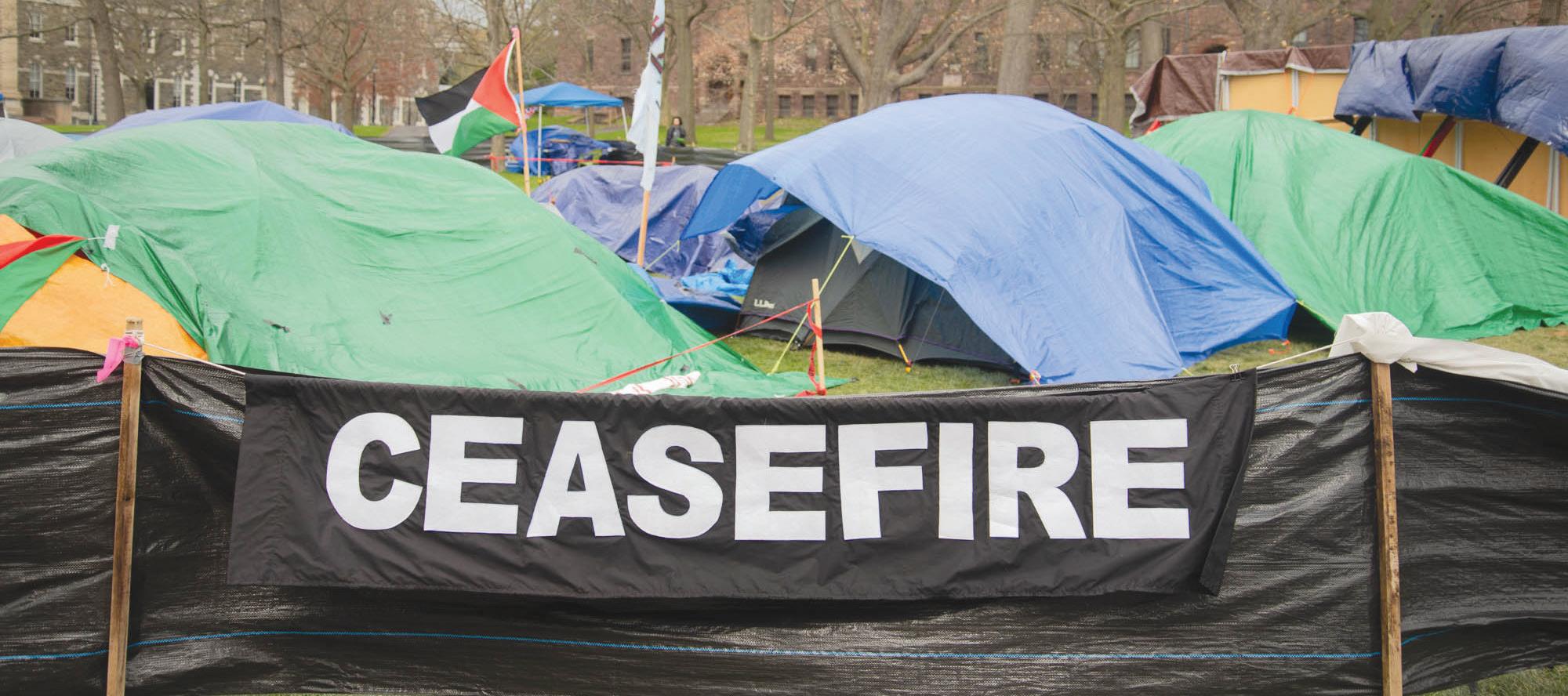
29 | “Ceasefire” The encampment sets up banners around its fence perimeters.
Luca Guadagnino’s Challengers has everything, and nothing, to do with tennis. As Zendaya’s character Tashi puts it, “Aren’t we always talking about tennis?” The film, though set primarily in 2007 and 2019 and sometimes in between, jumped around in time as the movie’s narrative progressed.It was shot on 35mm which gives the story a vintage, almost timeless feel just like Guadagnino’s previous movies. The film is centered around three characters: Tashi (Zendaya), Patrick (Josh O’Conner) and Art (Mike Faist). All three are exceptionally good tennis players poised to go pro as teenagers; Tashi and Art play at Stanford, while Patrick immediately tries to go pro. While the movie jumps around in time, it begins and ends with a titular Tennis match: Art vs. Patrick in the final of a challenger — a small pro tennis tournament in New Rochelle. The film is also frequently interrupted with scenes from this match, drumming up more and more tension with each thwack of the racket and Tashi’s intense stare from the crowd of spectators. As the movie progresses, the audience learns more about the history between the three all-stars, which includes friendship, romance, competition, passion, resentment and the already infamous almost-threesome.
Unlike most other tennis movies (and there has been an abundance of them, King Richard and Battle of the Sexes to name a few), Challengers uses the sport less as a focal point in which the plot and the characters move around and more as a narrative device in the character’s relationships. Additionally, it manages to eroticize a historically chaste, buttoned-up, country club sport in which one gets a penalty for the mere use of profanities (which the film makes sure to point out). Although there are sex scenes sprinkled throughout the film, anyone who has seen it will tell you that the real intimacy happens on the court. The central match foreshadows the repeated dynamic of the movie: Art and Patrick going at it (on the court, of course), while Tashi watches down the net, unflinching throughout. Though Tashi is used as a sexual intermediary between the two men, she

does so autonomously and with consciousness. The two seem to have sex with her as a way of having it with each other, and they do so on her terms in this fresh take on the classic menagea-trois trope. Tashi instantly recognizes the homoerotic elements of their friendship and tries to facilitate a connection, which only ever plays out in *that* scene and on the tennis court. Ultimately, she ends up getting caught between the two until the climatic match point of The Challenger tournament. The actors play all three characters perfectly, and they all have dimensionality throughout, while somehow maintaining a balance between their frustratingly unlikeable actions and a sort of charm.
Although the plot is fairly intriguing throughout, most of the film’s strengths lie in its artistic elements. The soundtrack, composed of mostly ’80s style EDM or classical/choral music, adds adrenaline to every scene. Where most movies aim to have their music enhance scenes and blend into the background, Challengers is not afraid to bring it to the foreground. The music is played over many scenes at an extreme volume, and fascinatingly, it works in perfect conjunction with the scenes, most of them tennis games. An additional highlight for me was the song “I Know,” which uses the ping-
ing of tennis balls instead of traditional percussion and captures the heart of the movie perfectly. Although not music, there is an almost constant hum of television in the background, and it is almost always a sports channel broadcast that throws out the names of the characters, which builds pressure as effectively as any suspenseful music would, yet exists within the world of the characters, meaning that they too can hear themselves being discussed and are thus affected by it.
In addition to the soundtrack, the shot compositions are perfect. Even the “messiest” scenes have a sort of perfection to them, adding to the intense visual appeal of the whole movie. The film also plays with cinematography, with some shots during tennis matches being filmed from a first person perspective, almost like the actor had a GoPro strapped to their chest. The parallels and emphasis placed on repeating motifs
throughout including the two boys’ serves, the two car scenes and even the use of Patrick’s “I Told Ya” shirt, which add visual tension to the relationship between the three, adding where words may fall short. Just like in tennis, most elements of the movie are played in doubles.
Although the film is sometimes a bit slow and some scenes are a little long, the movie is overall solid with a tight narrative. The ending is phenomenal and unexpected, which seems impossible given that in sports there always must be a winner. Overall, the film is funny, playful and absurd, making it a great watch and an excellent, albeit unique, addition to Guadagnino’s filmography.
Sophie Gross is a first-year in the College of Arts and Sciences. She can be reached at sgross@cornellsun.com.

GABRIEL LEVIN 26 Editor in Chief
MAX FATTAL ’25
Associate Editor
HENRY SCHECHTER ’26
Opinion Editor
MARIAN CABALLO ’26
Multimedia Editor
NINA DAVIS ’26
Photography Editor
ERIC HAN ’26
Arts & Culture Editor
SYDNEY LEVINTON ’27
Arts & Culture Editor
JADE DUBUCHE ’27
Social Media Editor
DANIELA ROJAS ’25
Lifestyle Editor
ISABELLE JUNG ’26
Graphics Editor
JOLIN LI ’27
Layout Editor
PARIS CHAKRAVARTY ’27
Layout Editor
CYNTHIA TSENG ’27
Assistant Photography Editor
LUCY CAO ’26
Assistant Photography Editor
ALLISON HECHT ’26
Newsletter Editor
The Sun's View
JULIA SENZON ’26
Managing Editor
ERIC REILLY ’25
Assistant Managing Editor
MARISA CEFOLA ’26
News Editor
MATTHEW KIVIAT ’27
News Editor
CHRISTINA MacCORKLE ’26
News Editor
KATE SANDERS ’27
News Editor
JANE McNALLY ’26
Sports Editor
GABRIEL MUÑOZ ’26
City Editor
KAITLIN CHUNG ’26
Science Editor
LAINE HAVENS ’25
Science Editor
ANUSHKA SHOREWALA ’26
Assistant News Editor
DINA SHLUFMAN ’27
Assistant News Editor
HAMNA WASEEM ’27
Assistant Sports Editor
NICOLE COLLINS ’25
Weather Editor
Earlier this month, our student government held a historic referendum. The questions it asked of the student body had wide-ranging implications: Should Cornell University call for an immediate, lasting cease-fire, and should it divest from arms manufacturers directly involved in the bloodshed in Gaza?
Undergraduates answered, with a supermajority of voters — and us, the Editorial Board of The Cornell Daily Sun — saying “yes” on both counts. Now, pro-Palestine activists are camping out on the Arts Quad, demanding an answer from the administration. The University has already suspended four peaceful student organizers and referred employee participants to HR. Now, President Martha Pollack is threatening further disciplinary action against activists.
Generations of Cornellians will look back at the administration’s clear intimidation of protesters with shame. As a fiercely independent student newspaper that has recorded the history of our Ithaca, New York campus for the past 143 years, we know that disruption of the status quo for important social causes is nothing new at Cornell.
Fifty-five years ago this month, Black Cornellians took over Willard Straight Hall in response to a cross burning and an administration that had always turned a deaf ear to their voices. Their powerful display led to an explosion in Cornell’s Black enrollment, a curriculum in Africana Studies, need-blind admissions and the creation of a student government that finally gave all of us a say in University affairs.
Years later, in 1985, students staged sit-ins and hunger strikes, constructing an encampment on the Arts Quad to reflect the appalling living conditions of a racially segregated South Africa. Their struggle ultimately resulted in the University selling swaths of its investments in Apartheid.
In 1993, Latino students occupied Day Hall after an art installation was defiled by vandals with racist graffiti. The work of those courageous activists who resisted bigotry led to the introduction of a Latino Living Center and the expansion of Cornell’s Latino Studies Program.
If Cornell has taught us anything, it’s that student protest not only works but that it’s central to learning.
Pro-Palestine demonstrations at Cornell follow a long-running tradition of civil disobedience — a tradition the University has tried unsuccessfully to quash over decades. It’s only fitting that community organizers would use the student government, a body formed in response to the ’69 Straight Takeover, to pass that referendum.
Cornell students today are simply doing what they’ve always done best: pushing back with nonviolence. President Pollack, if she has a shred of moral courage left, must immediately allow back the four students suspended in connection with the pro-Palestine encampment, though nothing she could do in the weeks running up to graduation will save this failure of a free expression year.
Read the full editorial at www.cornellsun.com.
Nick Wilson is a second-year undergraduate student in the New York State School of Industrial and Labor Relations at Cornell University. He can be reached at nww27@cornell.edu.
I
My Story.
My name is Nick Wilson, I am a second-year undergraduate in the School of Industrial and Labor Relations and yesterday I was temporarily suspended from the University for participating in a nonviolent encampment on the Arts Quad. I was suspended alongside three other students, all of whom received the same five charges, which included “[leading] or repeat[ing] chants throughout the day.” As of today, we have been withdrawn from all of our current courses, for which we may not receive credit, and we are not permitted to be on our campus (pending an unspecified grace period). The University initially threatened to evict me from my home on campus — but after an overwhelming wave of solidarity from faculty, Cornell Graduate Students United and the public writ large, administration agreed to allow suspended students to stay in residence halls for the remainder of the semester. Cornell would like you to believe that CML organizers are outside agitators who hate this university and seek solely to disrupt the lives and academic careers of our peers. That’s not true — I am a member of this community who truly wants to stay here and see my institution meet its values. This is my side of the story.
The first protest I ever attended — the first real one, where I felt that our actions represented a meaningful threat to those in power — was in Chicago in May of 2021, after Israel’s violent raid on peaceful worshippers in Al-Aqsa mosque. Israeli forces had used tear gas, rubber bullets and stun grenades on worshippers inside the mosque during Ramadan, and protestors the world over responded by speaking up and taking action. While marching with hundreds of friends and neighbors, I noticed one man nearby wearing a keffiyeh and carrying his daughter on his shoulders who was leading us in chants with a powerful, booming voice. After around an hour, his voice began to falter and quiet, and without much thought I found myself taking his place, leading the crowd in chants when he was unable. Often I was chanting in Arabic (a language I did not understand), but nonetheless I found that I was able to keep the crowd alive by taking his place. It was the first time I truly realized that my voice had power — power that could amplify the voices of the silenced and build community with my peers fighting for justice.
Espionage Act for giving an anti-war speech, Debs says “While there is a lower class, I am in it, and while there is a criminal element I am of it, and while there is a soul in prison, I am not free.” Here, Debs espouses the fundamental principle of solidarity, that an injury to one is an injury to all — and that when people are hurting, it becomes a moral imperative for us all to contribute what we can to their liberation. It falls to those with enough strength, knowledge, energy or resources to spare to do what they can. In my case, I have used my voice. t the CML-organized die-in in Klarman Hall this March, Cornell University Police Department officers repeatedly attempted to silence a member of our community giving a speech to hundreds of their peers. Though it initially seemed as though the rally would be forced to an end as the officers approached, our community suddenly did something beautiful. Chants began surging through the crowd of “let him speak” and “the more you try to silence us, the louder we will be.” Police approached the speaker several times, and each time the crowd filled the room with sound. Not only did they make it clear that our community was observing CUPD’s unjust actions, but this also made the room loud enough that the officers were unable to be heard to threaten or arrest the speaker. A similar moment occurred on the first night of our encampment on the Arts Quad. Administration threatened suspension and arrest to all students within the encampment past 8 p.m., so hordes of community supporters arrived before then to support us. In excess of 300 community members linked arms and formed three human chains surrounding the camp, making it clear that police could not make arrests or collect IDs for suspensions without forcibly pushing through them. No arrests or suspensions were made that night.
— The Editorial Board
I applied Early Decision to Cornell because I believed it was the best place for me to learn how I could most effectively use my voice to fight for justice. I am a socialist and a union organizer — I believe that the structural oppression of our status quo is impermanent, that a better world is possible and that only collective action by the working class can bring that world about. The ILR School was the best institution where I could deeply study labor history, organizing strategy and tactics and labor law as an undergraduate. I was thrilled when I got in, and clearly saw a place and future for myself in the Cornell community. I found my path as an organizer in my junior year of high school when my AP US History teacher assigned us American labor leader, socialist organizer and antiwar activist Eugene V. Debs’s ‘Statement to the Court.’ In defending himself against charges of disloyalty under the
Cornell seems to have learned nothing from these events. Their decision to pick off four student organizers reflects a belief that the Coalition for Mutual Liberation represents the top-down efforts of a few activist students. This is not the case. Our movement is international, with university students of all stripes across the world standing for an end to genocide. For each of us silenced by Cornell, untold masses on this campus and others will be compelled to take our place in the encampments. Around the encampment, I have already met countless students who said they had never come to a protest or political action on campus before — our movement grows by the hour and each new participant is just as much a part of what we’re building as I am. I could not be more confident in the capacity of my peers — who are immensely talented, principled and brave — to pick up the slack in my absence. This administration does not understand the massive swell of support virtually guaranteed in the wake of our suspensions.
I think all young people have at some point imagined what we might do if our government were to carry out a genocide. Looking back on the past, we hope to see a sliver of ourselves in the militant few who fought tooth and nail to end historical atrocities. But it is far easier to be anti-genocide when the bodies are cold, the blood is dry and an entire people, culture and history have already been eradicated. Bureaucratic institutions like Cornell have always told student organizers that we are naive, and that real change requires slow adherence to established systems and processes.
To continue reading, please visit www. cornellsun.com.
Re: “Cornell Suspends Four Student Protestors” (news, April 26).
It is disappointing that Cornell’s administrators, who have led us so well through other difficult times in recent years, suspended four student activists on Friday, and are threatening still more with suspension as students engage in peaceful and civil protests on the Arts Quad. Our students are not violating the Student Code of Conduct by setting up an encampment and periodically chanting slogans calling for freedom and an uprising against injustice. Their protests are not, in particular, violent, unlawful or harmful to the health and safety of others; these students have not used weapons or force. If any action of theirs is in violation of the Interim Expressive Activity Policy, hastily rigged to silence the broadcasting of sentiments that some people would rather not hear, then the policy is inconsistent with Cornell’s stated commitment to freedom of expression. There is, for example, no good reason to order protestors to disperse after 8 p.m. The idea that the student protest activities are disruptive to academic life is laughable: the Cornell chimes are far more disruptive, several times a day. And what about the disruption to academic life caused by suspending students, including graduate students teaching undergraduates?.
In any case, administrators should recognize that scapegoating students and faculty, who are the core of any university, to satisfy the bloodlust of Congressional Republicans doesn’t work, as President Shafik of Columbia has discovered even after capitulating to their demands.
Our administration should revoke these suspensions and rethink their position vis-à-vis students’ right to freedom to speak up as their conscience demands.
— Prof. Rachana Kamtekar, classics, philosophy
In their ongoing effort to criminalize solidarity with those the western world deems disposable, Cornell administrators have portrayed the encampment on the Arts Quad as a center of aggression and hatred.
What an obscene distortion!
In the few hours I spent at the encampment recently, I witnessed a safe, dynamic, radically inclusive space. Indeed, I saw an expression of what civil rights workers once called “the beloved community” — a society that enshrines the practice of fellowship, mutuality and agape love.
Within the encampment thrives a disciplined, diverse and well-organized microcivilization. Systems of food distribution and storage, trash disposal, etc. help maintain order. Work shifts are assigned. Resources are shared. Protected space is made available for both Muslim and Jewish religious observances.
The encampment exists to pressure the University to divest from the war machine. Its occupants reject the culture of indifference and the “common sense” of militarism, colonialism, capitalism and white supremacy. They hope to help restore our moral sanity.
Yet even as they expose the corruption of the prevailing order, the demonstrators are constructing an alternative public. The encampment is a site of teach-ins and mutual aid. It is a place of trust, compassion and empathy. Within its boundaries, patriarchy, homophobia and other oppressive structures are collectively challenged.
The encampment is a zone of deep democracy. Decisions are made in people’s assemblies. Ordinary people learn to take command of their lives. A purposeful search for new modes of belonging — and
Re: “Everything That Happened on Day Four of the Encampment” (news, April 29)
As Cornell faculty who regularly work with Arabic sources and who teach about the history and cultures of the modern Middle East, we are very concerned that the University Administration put out a misinformed statement accusing students in the encampment and their faculty supporters of antisemitism based on a failure to understand the literal and historical meaning of an Arabic word, intifada
The word “intifada,” which means “uprising,” comes from the root word “nafd,” which means “to shake off,” and is about resistance to occupation. In other words, intifada means “shaking off” occupation. Thus, when students chant, “Intifada, revolution,” it is a call for revolution and an uprising.
We find that the assumption that an Arabic language word implies violence (without even attempting to learn what it means) is often a racist trope and, in the context of what is taking place on campus, a dangerous one. We urge the provost, the president, the VP of University Relations and, indeed, the entire campus community to reach out to subject matter experts at Near Eastern Studies and other Cornell departments for education on matters related to Arabic, Hebrew, Turkish or Persian language and the history and culture (including conflicts) of the Middle East before making public statements that could cause further division and misunderstanding in an already very tense environment.
Prof. Alexandra Blackman, government Prof. Ziad Fahmy, Near Eastern studies Paul Kohlbry, postdoctoral associate, anthropology Jonathan Lawrence, postdoctoral associate, Near Eastern studies Prof. Mostafa Minawi, history Prof. Imane Terhmina, Romance Studies
Re: “‘Meet Us at the Bargaining Table’: Cornell Graduate Students United Rallies for Employment Protections” (news, April 10)
more humane ways of being — occurs. Shared recognition of the failure of established authority empowers all participants to devise and implement novel social solutions.
The encampment defies Cornell’s culture of conformity and narrow careerism. If the creed of individualism and the ethics of capitalist accumulation shape official campus life, a politics of caring and camaraderie guides the liberated zone. Its inhabitants rediscover themselves as political actors. They cease to be mere objects on the conveyor belt of professionalization.
The rulers of the modern university wish to appease the donor class. They want the encampment to disappear. They look to police the crisis, to manage optics. They will be relieved when the status quo again appears inevitable. The encampment, however, knows that calls for security and bureaucratic procedure are demands for acquiescence. Administrators may intimidate and punish students; they cannot govern consciousness.
The encampment is a makeshift university. It is a library, a cooperative, a mosque, a synagogue. It is hardly a utopia. Yet it is utopian in the sense that the terms of living that it demands are impossible under existing conditions.
The encampment is temporary, but it will surely spawn more “counterinstitutions” able to counteract hegemonic values, unmask indecency and prefigure the just society. Prototypes of insurgent democracy will flourish as long as anticolonialism and principled internationalism are heretical and silent complicity in genocide remains the price of normalcy.
In coverage of the CGSU-UE’s Rally for Respect, the Cornell Daily Sun broadcasted the union’s unscrutinized propaganda advocating for union shop, a clause in our proposed contract which forces all grad students to support the union as a condition of earning our degrees. Rally speaker Amy Tsai described union shop as a “contract provision that means everyone is automatically a member of CGSU-UE.” This is a lie! Nobody automatically becomes a member. In fact, when MIT’s grad student union was charged with breaking the law for telling this exact lie, the NLRB required them to post a notice of their unfair labor practice. In reality, the union can at most compel us to pay “agency fees,” regular dues minus those funds dedicated to political activity, while eliminating our right to vote on our contract.
The truth undermines Tsai’s primary defense of union shop: protection from advisor retaliation. Joining a union is always a choice, albeit one under considerable coercion, and forcing non-members to pay is no shield. CGSU-UE’s union shop is more about securing a cash flow than securing grad students. This is no secret given how they unabashedly bemoan the work of convincing new students of the union’s benefits before siphoning off their paychecks, dismissing such representation as not a “real issue.”
As the purported bedrock of a strong union, union shop is couched as defense of academic freedom (for union-approved messages), but in practice it would compel grad students to financially support all union expression. Though agency fees technically cannot contribute to political activity, this rally, which no doubt counts as union representation chargeable to non-members, was full of political speech. Besides two speakers discussing lab safety and advisor retaliation, the rest used the platform to make overtly pro-Palestinian statements, including a wisecrack about Zionists and allegations of racialized enforcement of the student code of conduct..
I commend all of the speakers at the rally for their willingness to publicly champion their ideas. My point is that this activity is manifestly political, controversial and of a fundamentally different kind than negotiating free TCAT passes for grad students. I zealously defend CGSU-UE’s liberty to express their views, but I ask them to respect my liberty not to. Union shop necessarily compels affiliation and support for union expression, which is inimical to academic freedom. The union has enough power already to win economic gains. Demanding my voice for political expression is going too far. To borrow an illustrative quote from the union rally, “Today, it is Palestine. Tomorrow, who knows what it will be?” I hope it’s vision and dental insurance.
— Benjamin Gregory grad
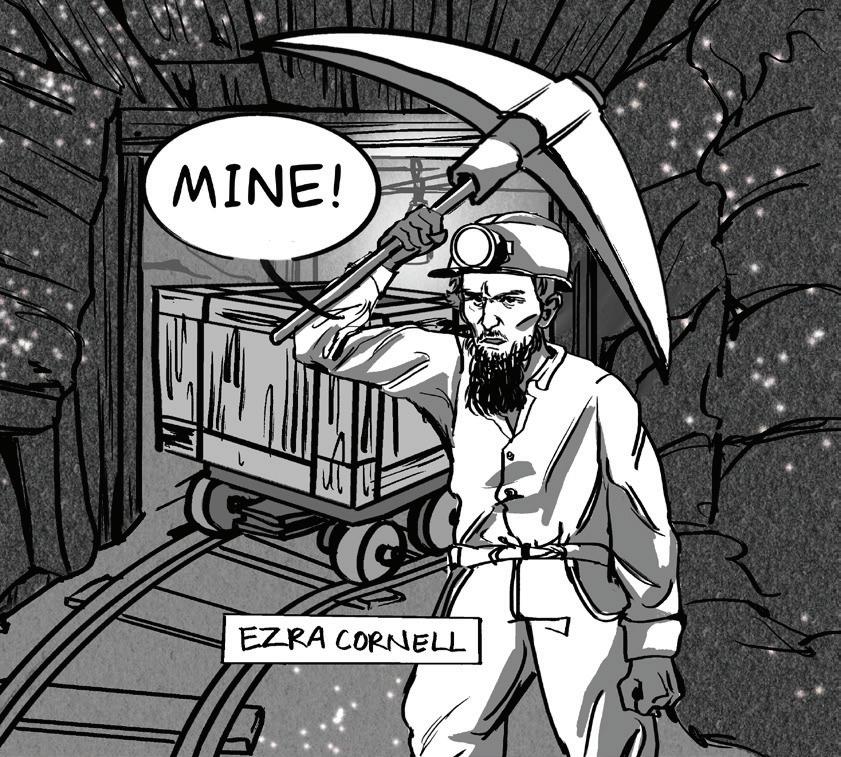


CLASSIFIED AD RATES
Ads are accepted at The Sun’s office at 139 W. State Street downtown, by phone or e-mail.
Deadline: 2:30 p.m. at The Sun’s office on the day preceding publication.
Standard Rate: $3.95 per day for first 15 words, 39 cents per day per word thereafter. Five or more consecutive insertions, $3.70 perday for first 15 words, 37 cents per day per word thereafter.
Commercial Rate: $5.95 per day for first 15 words, 40 cents per day per word thereafter. Five or more consecutive insertions, $5.75 perday for first 15 words, 38 cents per day per word thereafter.
The Sun is responsible for only one day make good on ads. 273-3606 classifieds@cornellsun.com
From the Archive: March 26, 1976
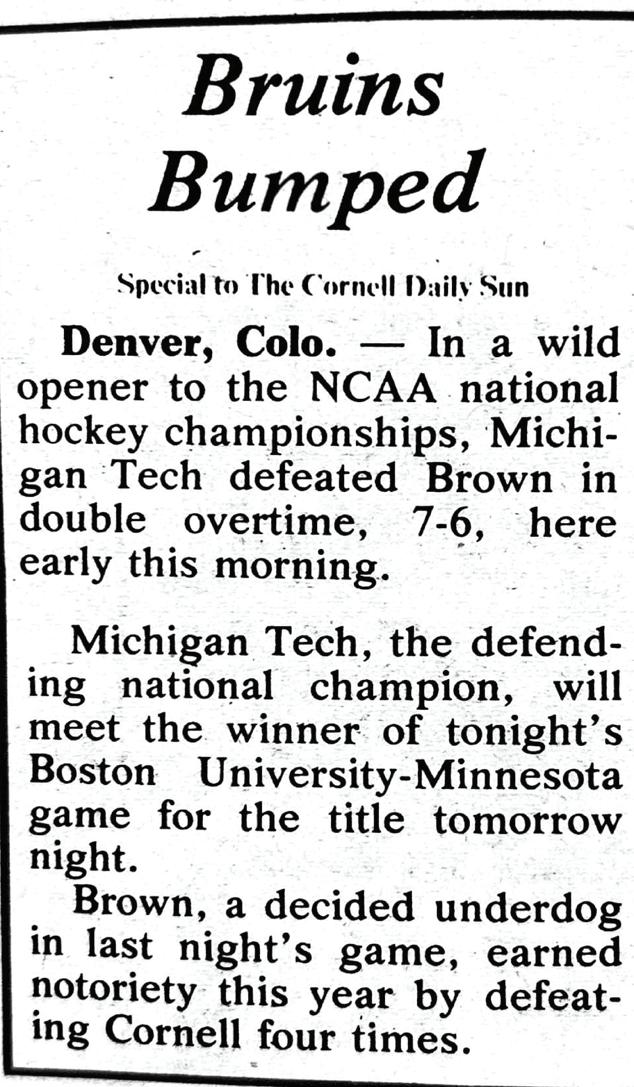

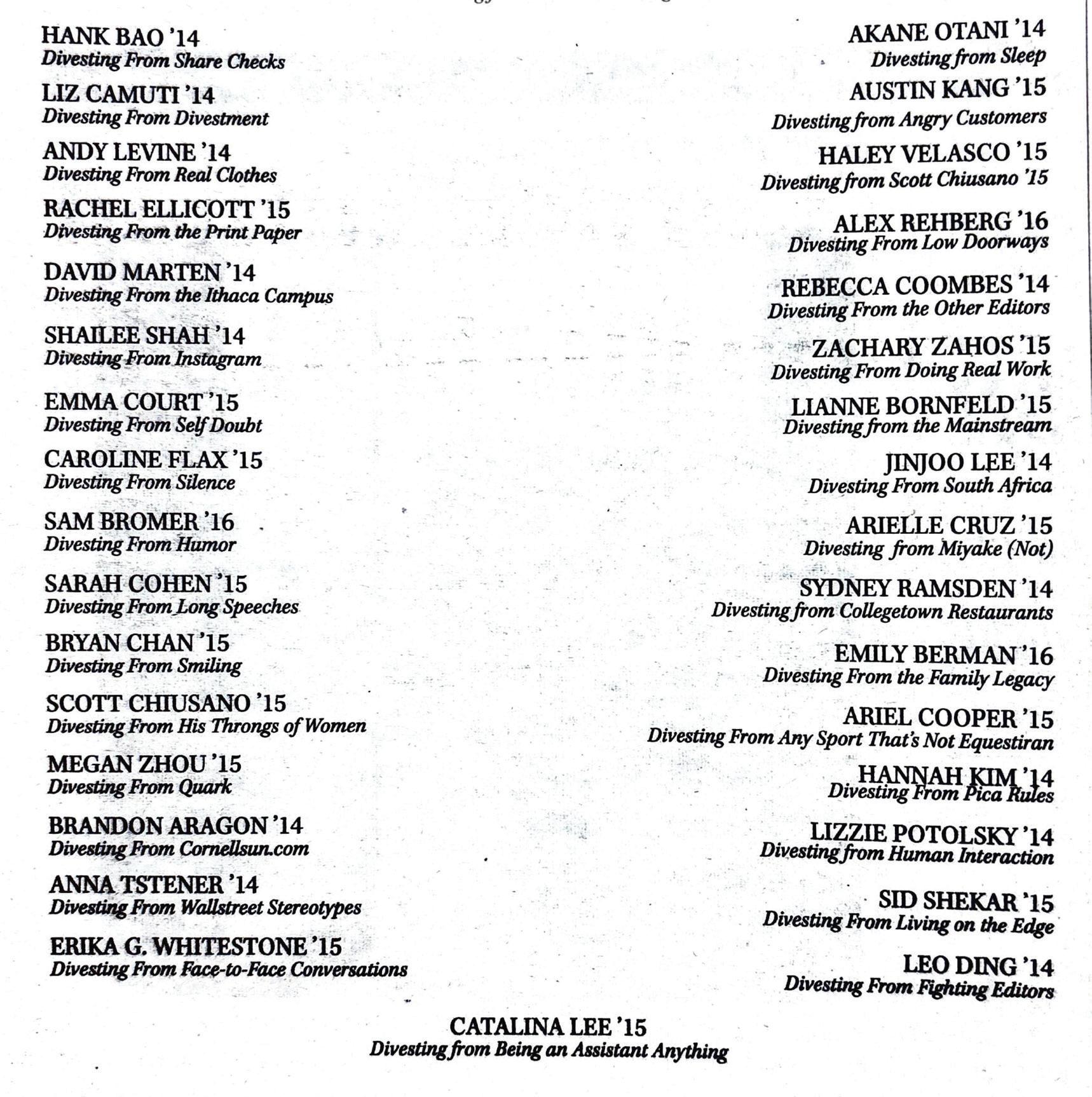
SUSPENSIONS
Continued from page 1
International students who face suspensions could enter violation of their F-1 status. If students are found in violation of United States immigration law, they may be required to leave the United States if they are not able to enroll as full-time students either in their current institution or a transfer institution.
Waked said the measure disproportionately penalizes international students by endangering their legal status in the country, which domestic students are not subjected to.
“What that sounds like to me, is that our right to free speech is not as important as American students’ rights, or rather, comes at a much higher cost than American students,” Waked said.
During negotiations Thursday night, Waked asked Christopher Cowen, executive vice president and chief financial officer of Cornell, whether administrators evaluated the potential repercussions for international students in their consideration of suspending students.
Cowen said students needed to consider how suspensions meant varying implications for students under different conditions. Beyond international students, credit
loss for seniors means they can not graduate on time.
Students who reside in University housing or are subscribed to a meal plan are given a short grace period to continue using those select University resources, according to the email sent to suspended students, which was obtained by The Sun. The email did not specify the length of the grace period or timeframe for students to vacate.
Wilson currently lives on campus.
“What that sounds like to me, is that our right to free speech is not as important as American students’ rights, or rather, comes at a much higher cost than American students.”
Bianca Waked
The email also stated: “If you need to access Cornell Health for health care, you will be permitted to do so.”
In a press release sent to The Sun, the Coalition for Mutual Liberation labeled the suspension as an attempt from the administration to silence students. The organization asserted that demonstrators would not waver in
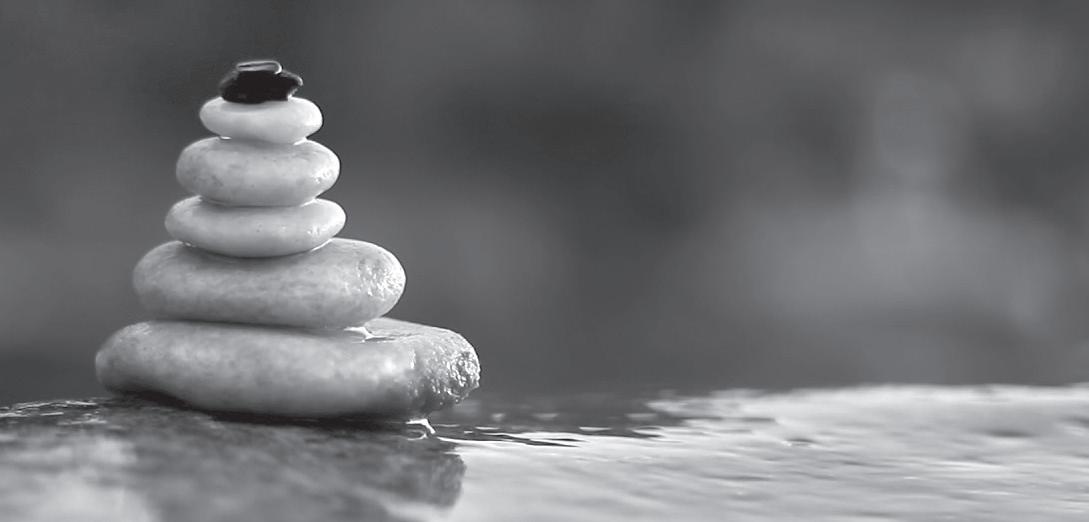
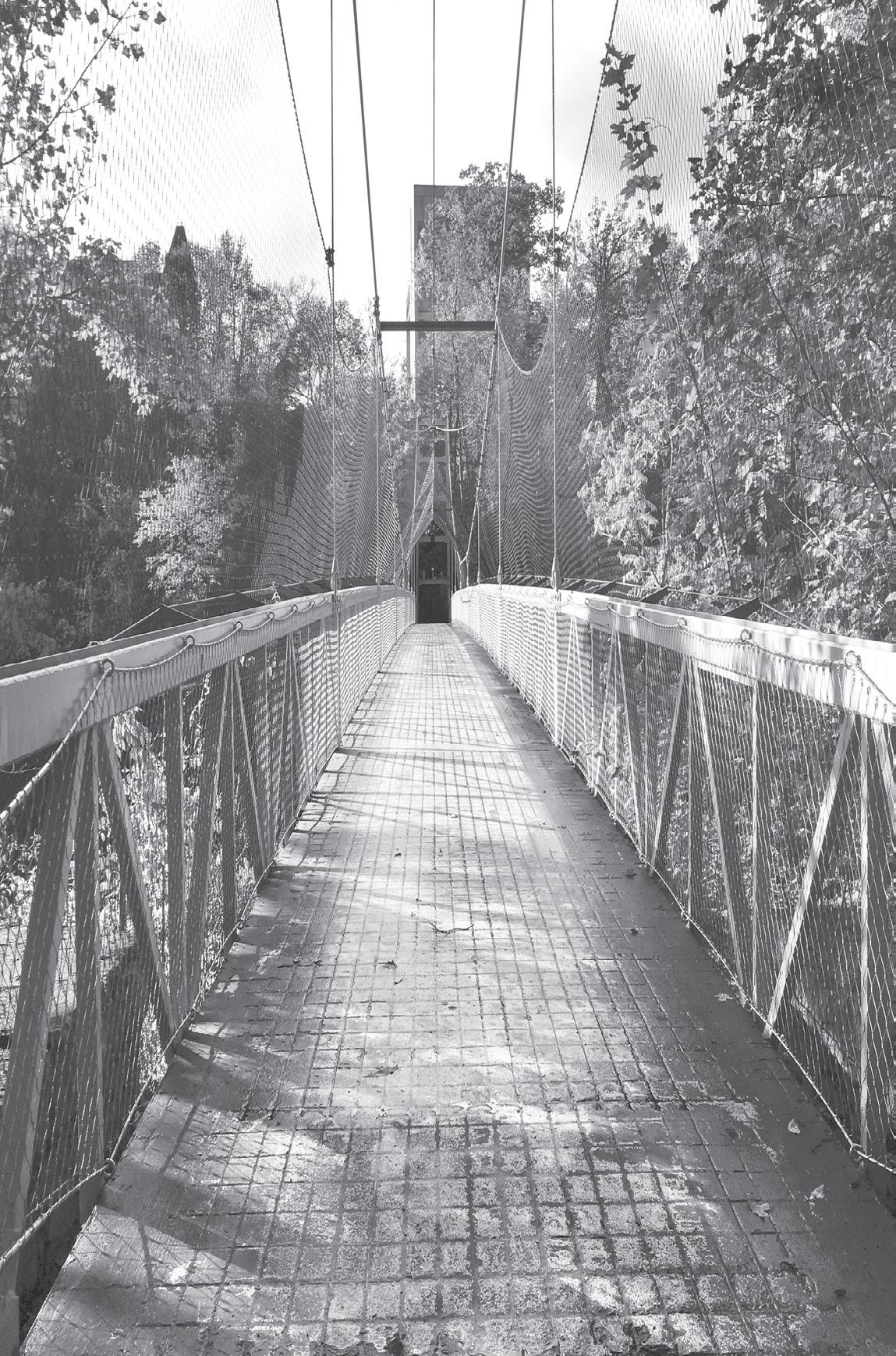
their cause.
“Our demands remain the same, and we raise our voices in unison to say: Divest Now.”
CML Press Release
“Our demands remain the same, and we raise our voices in unison to say: Divest Now,” the press release read.
“I think the idea that silencing students — that
arresting and suspending and taking disciplinary action against your own students — is going to stop our movement or is going to stop the national cause from divestment from the genocide in Gaza is absolutely false,” Wilson said.
Waked said the administration was hypocritical in their standards for allowing different kinds of speech on campus, citing recent conservative speakers invited to campus.
“We have watched speak-
ers like Ann Coulter who have said utterly egregious things about the Jewish community get invited with open arms,” Waked said.
“And apparently an encampment in which students were dancing and feeding each other, and having teach-ins by faculty members is the real threat to this University according to the administration.”

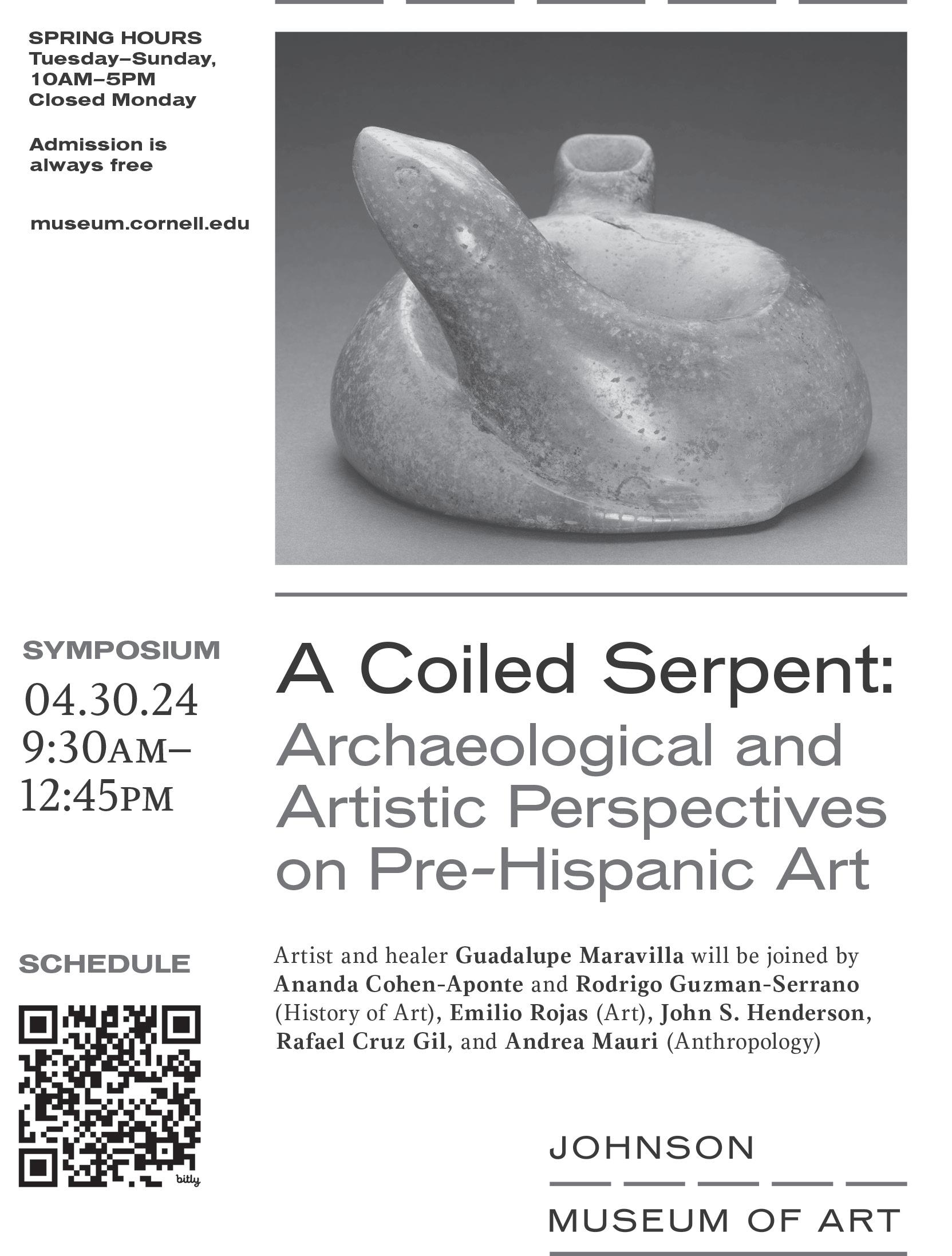
 By JANE McNALLY Sun Sports Editor
By JANE McNALLY Sun Sports Editor
Taking the field one final time in the regular season, men’s lacrosse clinched the regular season Ivy League title in a 15-10 victory over Dartmouth. The win marked the Red’s third consecutive regular-season crown and 32nd in program history.
“To win the last two [titles] outright specifically, … it’s exciting for us,” said head coach Connor Buczek ’15.


And though it was the last time Cornell would take the turf for the regular season, it is far from the last time the Red will play in 2024 — imminently, Cornell will host the Ivy League tournament next weekend, May 3-5. And, regardless of those results, the No. 9 Red are on track for an NCAA Tournament bid.
“It’s exciting to have that type of success,” Buczek said. “[But] the standard’s high here. The expectation is that we are competing and winning those titles and we are at the top of the league year in and year out.”
Saturday’s win over Dartmouth (3-10, 0-6 Ivy) — the only Ivy team winless in its conference — featured a four-goal, seven-point performance from senior attackman CJ Kirst and a hattrick by junior
attackman Danny Caddigan.
On the other side of the ball, junior goalkeeper Wyatt Knust fended off any ounce of a Dartmouth attack, making 18 saves on the day for a stellar 72 percent save percentage. Freshman goalkeeper Matthew Tully slotted in for the final 3:05 of the contest and allowed three goals.
“I think [the defensive group has] done an incredible job coming together. … [Knust] has really matured through that whole process and the ups and downs of the year,” Buczek said. “I think we are finally hitting the point [where] that group is playing very unified and together.”
A mere few hours before the opening faceoff, Yale — which had been in contention to host the postseason tournament along with Cornell — lost to Princeton, 15-8. The result sealed home turf advantage for the Red and essentially rendered the result of the Dartmouth game moot.
“I think I’d be lying to say [that] we didn’t know it had happened,” Buczek said. “The nice part was we knew we were going to be home. The reality was, we had an opportunity to win [the regular season title] outright.”
Nevertheless, the Red (9-4, 5-1 Ivy) came out shooting like there was no tomorrow. 17 seconds into the game, Freshman midfielder Luke Gilmartin collected a rebound and buried it on a dive for a quick 1-0 Cornell lead. Sophomore long stick midfielder/defenseman Brendan Staub notched another score a few minutes later, a goal that awarded senior defenseman Jack Follows his first career point.
Two Dartmouth goals sand-
wiched a tally from freshman attackman/midfielder AJ Nikolic, before a 3-0 run to end the quarter ensued for the Red — freshman attackman Ryan Goldstein, fifthyear midfielder Aiden Blake and Kirst all found the nylon to give Cornell a 6-2 lead after a quarter of play.
Nearly five minutes of the second quarter passed before a team got on the board, and that was Dartmouth at 10:07. The Big Green added two more in the second frame, but four goals by Cornell — two each from Kirst and Caddigan — cushioned the Red to a 10-5 lead at half.
“It’s exciting to have that type of success. But the standard’s high here. The expectation is that we are competing and winning those titles and we are at the top of the league year in and year out.”
Head coach Connor Buczek ’15
The second half was much more evenly contested, as both teams tallied five goals apiece before the final horn sounded. Dartmouth’s attack progressed but was largely stifled by Cornell’s defense, a group that has taken strides over the course of the season to fill the voids left by Gavin Adler ’23 and Chayse Ierlan ’23.
“We’re making the change-ups
in our lineup that have been necessary to get us to a point that we are competitive in every game,” Buczek said. “We’ve lost some big pieces and guys that have missed some significant minutes, and the nice part is it’s not a story from you guys — that ‘next man up’ mentality has proved strong within our group.”
While Cornell has been known for its third-quarter offensive prowess, the defensive side of the ball shone through on Saturday. Senior midfielder Hugh Kelleher notched two goals while 10 saves by Knust kept the Big Green off the scoreboard.
Individual performances and stats were bolstered in the final quarter, as Caddigan and Goldstein capped off their multi-point afternoons while fifth-year attackman Spencer Wirtheim added a goal of his own. Dartmouth tallied five goals in the final frame, but it wouldn’t be enough as Cornell emerged victorious.
Absent from the Red’s attack, notably, was fifth-year attackman Michael Long. Holding an injury-riddled history, Long missed his first action of the year on Saturday, but traveled with the team to Hanover.
After sealing the outright Ivy League regular season title, Cornell will shift gears to next weekend, where it will benefit under the lights of its own field.
The Red will take action in the Ivy League Tournament semifinal against Penn on Friday, May 3 at Schoellkopf Field. The opening faceoff is slated for 8:30 p.m.